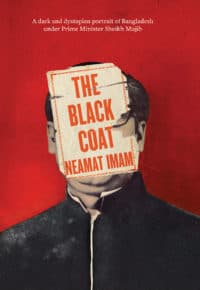PLOT: 5/5
CHARACTERS: 5/
WRITING STYLE: 5/5
CLIMAX: 4/5
ENTERTAINMENT QUOTIENT: 5/5
I trace my roots to Jamalganj, a sleepy village in Bangladesh. My grandfather was born there; my father and my uncles were born there and I too, was born, not very far from the border.
During the 1971 exodus, when thousands of refugees poured into India from Bangladesh, my grandfather and my uncle decided to stay back.
They still live there and visit us sometimes. I remember spending many summers in that laidback village; eating Alphonsus, swimming in the numerous ponds, fishing and playing football.
Neamat Imam’s mail, asking me to review his book, The Black Coat, rekindled those memories and took me back in time.
Most of us in India, remember 1971 as the year in which we had fought a war with Pakistan.
We do not realise the importance of that war, which led to the birth of a new nation, a new neighbour – Bangladesh. This book, set in the nascent period of Bangladeshi independence, is a satire on the Mujib government of that time.
The narrator, Khaleque Biswas, is a fiery war-time reporter, who is hell-bent upon writing about the deficiencies of the new government in the newspaper he works for.
As fate would have it, he is terminated from the job and all his principles, values and sense of judgement are washed away with it. Soon he finds himself in the company of Nur Hussain, a youth who has moved to Dhaka in search of employment.
When Biswas realises that Hussain lacks any basic skill and is only adept at mimicking the famous 7th March speech of Sheikh Mujibur Rahman, he starts organising corner shows to earn a few takas, where Hussain delivers the speech to beggars and the destitute.
They come to the notice of the local Awami League leader and then to the notice of the man they have been mimicking, Sheikh Mujib himself.
The politicians take full advantage of Hussain’s talent to subdue the growing discontent amongst the masses and in return, they fill Biswas’s coffers.
With the inflow of monies, Biswas’s upright character withers away but, Hussain evolves from being a mere puppet of Biswas to a vocal opponent of Mujib.
The rest of the story is on similar lines, touching upon the ever-changing characters of Biswas and Hussain, and the irreparable strains developing between them.
The characters in The Black Coat are just amazing.
Each of them weaves a magic so well; they force you to put on their shoes, see the world as they see it, feel things as they feel it. They force you to rethink about the perils of human life and are sure to wake you from your slumber.
Though this book is a work of fiction, it comes across as a true picture of the troubled Bangladeshi history of those times.
There are so many emotions in this book which touch your heart and squeeze it, it is difficult to bring out the same magic in my meagre review.
It would only suffice to say, I have not read a better book than The Black Coat, ever.
